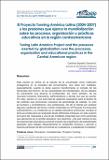| dc.contributor.author | España Chavarría, Carolina | |
| dc.contributor.author | España, Carolina | |
| dc.date.accessioned | 2020-07-24T22:45:19Z | |
| dc.date.available | 2020-07-24T22:45:19Z | |
| dc.date.issued | 2017 | |
| dc.identifier.issn | 1659-3464 | |
| dc.identifier.other | https://www.revistas.una.ac.cr/respaldo/ | |
| dc.identifier.uri | http://hdl.handle.net/11056/17742 | |
| dc.description.abstract | Este escrito se centra en el estudio de la universidad como institución protagónica en la sociedad del conocimiento. Sus retos son múltiples, especialmente cuando la tarea supone transformarse al compás de las demandas del entorno, de las necesidades del estudiantado, de los estados de crecimiento que alcanza el profesorado, así como también, de los recursos humanos, financieros, administrativos y demás con que se cuente. Por esto, pensar en una sola lista de aspectos necesarios para el diseño de las políticas que promuevan procesos de aprendizaje de calidad, no solo es burlesco y contradictorio, sino pretensioso. De allí el interés por analizar algunas cuestiones de forma y fondo contenidas en el Proyecto Tunning para Latinoamérica y su incidencia en la calidad educativa promovida. Aunque el tema se presta para ser analizado desde diferentes enfoques, en esta ocasión se busca dar respuesta a una de las múltiples preguntas que como personas que ejercemos en el ámbito educativo nos hacemos: ¿De qué manera el tipo de experiencias educativas aumenta el grado de preparación del estudiantado graduado para trabajar eficientemente en ambientes diversos y permitir a quienes participen de ello convertirse en ciudadanos y ciudadanas mundiales? | es_ES |
| dc.description.abstract | This paper focuses on the study of the University as a meaningful institution in today’s society. Its challenges are many, especially when the task is transformed to the beat of the environment’s demands, the student’s needs, the educators state of growth, as well as, human, financial, administrative, and other available resources. For this reason it is contradictory and even pretentious to think about a single list of aspects needed to design educational policies in order to promote quality in the learning processes. This situation leads us to the analysis of some issues related to form and content of the Tunning Project for Latin America and its impact on the quality of education promoted. Although the topic lends itself to analyze the target topic from different perspectives, this time the intention seeks to respond to one of the many questions teachers ask themselves: How the type of educational experiences increases the degree of preparation of graduates to work efficiently in diverse environments and enable participants to become global citizens? | es_ES |
| dc.description.sponsorship | Universidad Nacional, Costa Rica | es_ES |
| dc.language.iso | spa | es_ES |
| dc.publisher | Editorial Universidad Nacional | es_ES |
| dc.rights | Acceso abierto | es_ES |
| dc.rights.uri | http://creativecommons.org/licenses/by-nc-sa/4.0/ | * |
| dc.source | Respaldo Revista Internacional de Administración de Oficinas y Educación Comercial Número 3 Año 2017 29-47 | es_ES |
| dc.subject | EDUCACIÓN | es_ES |
| dc.subject | COMPETENCIAS | es_ES |
| dc.subject | PROYECTO TUNNING | es_ES |
| dc.subject | EDUCATION | es_ES |
| dc.subject | COMPETENCIES | es_ES |
| dc.subject | TUNNING PROJET | es_ES |
| dc.title | El Proyecto Tunning América Latina (2004-2007) y las presiones que ejerce la mundialización sobre los procesos, organización y prácticas educativas en la Región Centroamericana | es_ES |
| dc.title.alternative | Tuning Latin America Project and the pressures exerted by globalization over the processes, organization and educational practices in the Central American region | es_ES |
| dc.type | http://purl.org/coar/resource_type/c_6501 | es_ES |
| dc.description.procedence | Escuela de Secretariado | es_ES |
| dc.identifier.doi | http://dx.doi.org/10.15359/respaldo.3-1.2 | |


